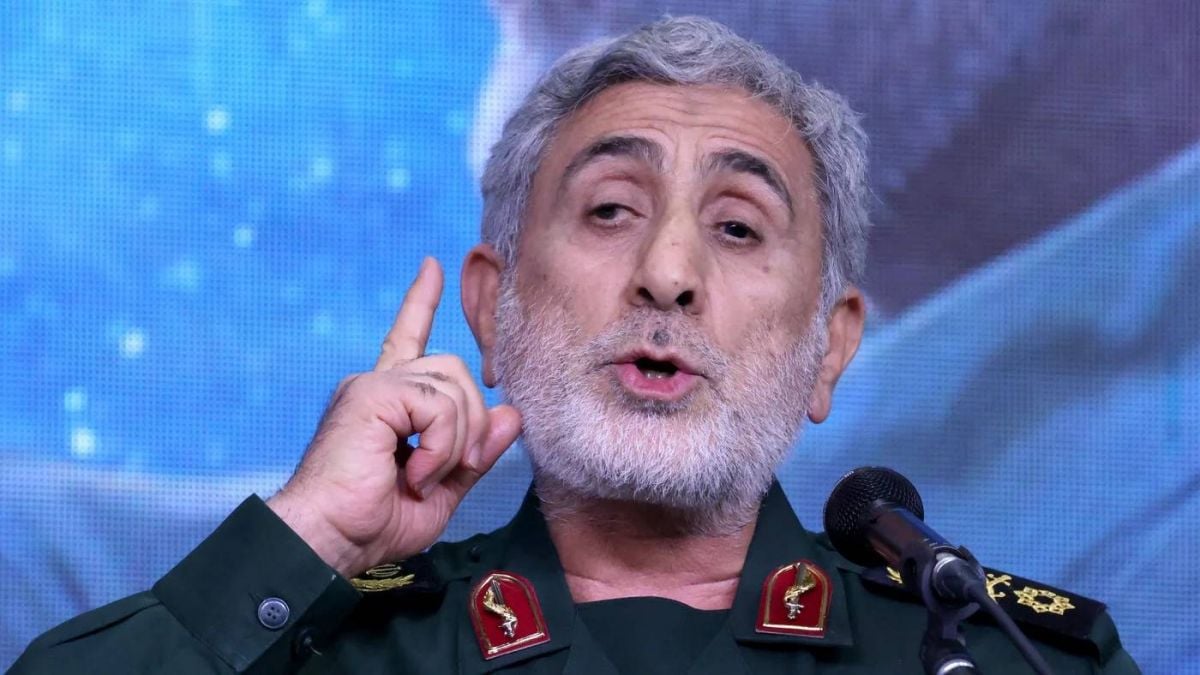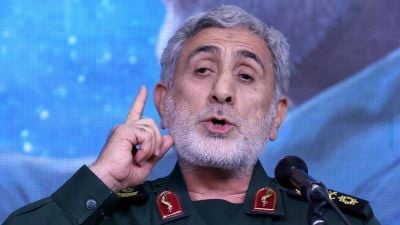
Esmail Qa’ani, head of the Quds Force of the Islamic Revolutionary Guard Corps, speaks at a commemorative ceremony in honor of Qassem Soleimani in Tehran in January 2024. (Credit: Atta Kenare/AFP)
The head of Iran’s elite Quds Force of the Revolutionary Guards, Esmail Qaani, revealed on Saturday that former Hezbollah Secretary-General Hassan Nasrallah was not killed solely by the powerful bombs used in the massive Israeli attack, but also by chemical agents, describing it as a “manifest war crime.”
Hassan Nasrallah was killed on Sep. 27, 2024, at 6:21 p.m., by particularly powerful Israeli strikes on the southern suburbs of Beirut. On that day, using more than 80 bombs dropped within seconds, Israel struck Nasrallah’s underground bunker located within a six-building block, identified as Hezbollah’s command center. This is the first time the theory of chemical agents being used has been mentioned.
In a televised interview broadcast by the Iranian Tasnim agency, Esmail Qaani also discussed the confidential preparations for Hamas’s Oct. 7, 2023 attack, noting that many senior figures in the Iran-aligned axis, including Ismail Haniyeh and Hassan Nasrallah, were unaware of the timing and details of the operation. “Neither we, nor Hassan Nasrallah, nor even Hamas leaders were informed of the exact date of the operation. When the start of the operation in Gaza was announced, Ismail Haniyeh was on his way to the airport for a trip to Iraq, and he learned that it had started upon his return,” Qaani said.
Despite this, the Hezbollah leader had “carefully and methodically defined the necessary steps,” he added, noting that Hezbollah opened a “Front of Solidarity” with Hamas in Gaza from Oct. 8, firing on Israel from southern Lebanon.
‘Nasrallah mastered all dimensions of the war’
“Until his martyrdom, the late Hassan Nasrallah confronted the Zionist regime in psychological and military warfare with wisdom and firmness,” the Iranian general said, recalling the two weeks after Oct. 8 during which Nasrallah did not give a speech. “During this period, without even speaking, he terrorized the Zionist regime and showed that he mastered all dimensions of the war, both military and psychological.”
Qaani added that the “pressure” exerted by Hezbollah had forced Israel to “deploy a third of its army to southern Lebanon.”
“Beyond the difficulty of the operations, it was extremely challenging to provide the necessary resources under such circumstances, but despite existing constraints, Hezbollah forces managed to hold firm for 66 days against the army of the Zionist entity supported by all global powers,” he said. After two months of an extended Israeli offensive on Lebanon, a cease-fire agreement came into effect on Nov. 27, 2024.
Esmail Qaani also highlighted the role of Hachem Safieddine, the brief successor to the Hezbollah leader, whom he described as a “pillar” in cooperation with Nasrallah and in managing the non-military aspects of the party. Safieddine was killed in a massive Israeli strike on the night of Oct. 3–4, 2024, in the southern suburbs of Beirut, a week after Nasrallah’s death, to whom he was expected to succeed as party head.
